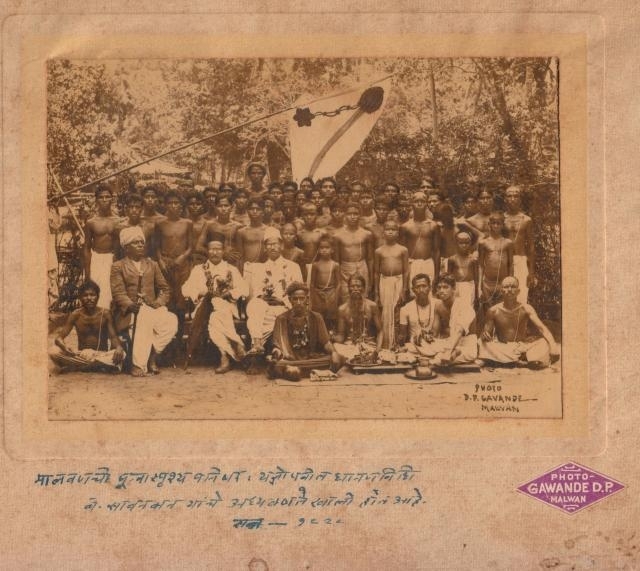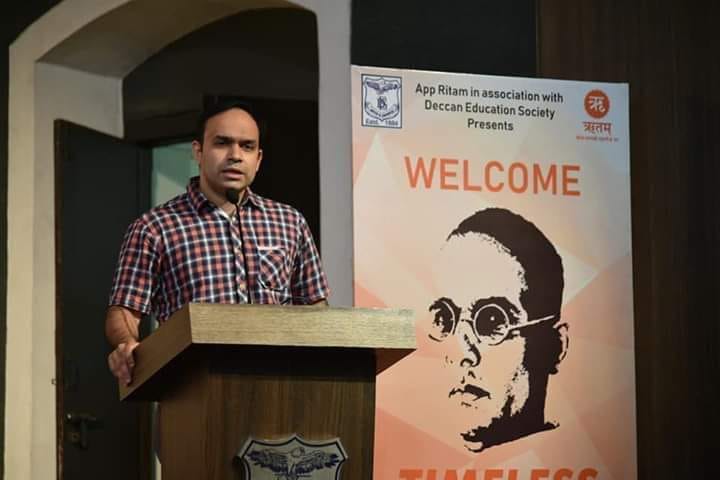Vratbandh Ceremony of All Castes in Pune - A Social Revolutionary step taken by “MeSavarkar” group
The path adopted by Savarkar, with a thought to bridge the caste divide, the “MeSavarkar” group thought of organizing mass Vratbandh ceremony of all castes together in Pune.
Total Views |
Today still our society is being divided on caste lines by certain elements of our own society. Savarkar had taken a revolutionary step way back during his Ratnagiri stay (from 1924 to 1937) and promoted Vratbandh Sanskar (which otherwise was being done only of Brahmin boys) amongst non-Brahmins. This was a big social revolutionary step flowing against the then existing current. Even after almost 100 years the Vratbandh Sanskar is limited amongst Brahmins only and therefore same problems haunt the Hindu community today. Hence, following the path adopted by Savarkar, with a thought to bridge the caste divide, the “MeSavarkar” group thought of organizing mass Vratbandh ceremony of all castes together in Pune.
This is going to be an annual program and the Muhurt (auspicious day) decided for the same is the birth date of Savarkar i.e. 28 May 2022, Ashwamesh Hall, Karve Road, Pune. More than 35 children from various castes of Maharashtra have been registered for this program and it's very encouraging that there is a lot of support for this program from the Brahmin community. People have come forward voluntarily to work for the same and even donate good amount of money for this. This is a very welcome step and if this feeling is encouraged even more, then the future of our country is indeed bright.
As mentioned above, organizers of this all castes Vratbandh ceremony had taken inspiration from Veer Savarkar’s ex-untouchable Conference held in Malvan on 19 May 1929. Let’s see in detail about this.
According to Savarkar, the Hindu society was bound by seven Indigenous shackles (Bandi or Sapta-Bedya). He rigorously fought to break these seven Indigenous shackles just as much as he strived to overthrow the foreign shackle of India by the British. Savarkar stated, 'Scripture-based caste division is a mental illness. It gets cured instantly when the mind refuses to accept it. The seven indigenous shackles whose breaking will liberate this Hindu Nation from the illness and demonic possession. (Samagra Savarkar Vandmay- Vol 3, page 497-499)

These Seven Indigenous Shackles were:
2. Prohibition of pursuing certain occupations (Vyavasay-bandi)
3. Prohibition of touch of certain castes (Sparsha-bandi)
4. Prohibition of sea-faring (Sindhu-bandi)
5. Prohibition of reconversion to the Hindu fold (Shuddhi-bandi)
6. Prohibition of inter-caste dining with certain castes (Roti-bandi)
7. Prohibition of inter-caste marriages (Beti-bandi)
At that time, access to Vedic literature and rituals or performing Vedic rites was exclusivity of Brahmins and others were traditionally debarred from it. Savarkar vehemently said that, All Hindus has equal rights and access to the Vedas. Savarkar said:
"We do not regard the ancient works as all-pervading, omniscient and perfect by themselves. The Smritis and the Vedas we love reverentially, not as omniscient and unchangeable works, but as historical books and as the landmarks in the great and glorious journey of the human race." (Keer, Dhananjay. Veer Savarkar, Popular Prakashan, Mumbai, Second edition, 1966, page 206)
He also said that 'Sound and practical scientific values should be the Vedas of our nation in this era of global competition' and 'We do not consider any religious text and belief as permanent. We do not consider Smriti's as the ultimate truth but nor willing to accept the truth as the final word.' Such was rational thoughts of Savarkar, who was portrayed as an orthodox, Manuvadi etc, regarding Vedas, Smritis and scriptures.
On 19 May 1929, Ex-untouchable Conference held in Malvan, a town in the southern part of Ratnagiri district, and Savarkar was invited to preside over it. On Second day of conference Savarkar decided to distribute sacred threads (Yagyopavit or Janeu) to all ex-untouchables.
Savarkar was a Chitpavan Brahmin, but he didn't feel any special of wearing Yagyopavit. If anybody from any cast or community demands it, then discrimination shouldn't be allowed based on caste or community. Savarkar refuses Brahmins exclusivity of Yagyopavita. he was fighting against hegemony, dominance and privilege of any particular community. No special privilege to anybody and fighting for equal rights to all, was his simple fundamental philosophy and principles.
In above mentioned ex-untouchable Conference in Malvan, Vedic rites were performed under the leadership of Vasudev Shreekrushna Hardikar from Shastree family of Ratnagiri and a young Savarkar associate. Lots of ex-untouchables chanted Gayatri Mantram collectively under the leadership of Subhedar Ghatge, a leader of Mahar community from Pune and was also member of Pune Hindusabha executive committee in 1926. Savarkar has given them pledge which they repeated after him conjointly. Savarkar spoke at this historic occasion:
"A battle royal has been raging for the last seven generations over the right of studying the Vedas. Here are the Vedas. Here is the sacred thread. Take these two. Is that all? Even non-Hindus read the Vedas. Why can't the Hindu Mahars read them? It was all hypocrisy. Both yours and ours quarrel over this problem was a useless task. Let us expiate the sins we committed. We are all responsible for our political subjugation. That is the past. Now let us declare on oath that we shall rectify our past blunders and win back our weal, wealth and glory. The people who regard untouchability which has been a disgrace to humanity as a part of their religion are really the fallen people." (Keer, Dhananjay. page 182 and Ratnagiri HinduSabheche Prativrutta- Vol 2, Publisher: Achyut Eknath Malushte, Ratnagiri, 1937, page 19)
Thus, Savarkar broke the shackle of Vedokta-bandi by distributing sacred threads to all ex-untouchables and performing Vedic rites and by chanting Gayatri Mantra which was forbidden to them till that time. Vedokta-Vaad (Vedic rites dispute) is well known to Maharashtra, so on this background, this was revolutionary step taken by Savarkar to resolve this dispute. Savarkar fought by intellect and actions to abolish caste system and to break seven Indigenous shackles.
I conclude with Savarkar scholar Dr. Shreerang Godbole’s statement, "Savarkar did his stupendous work in the field of social reform after undergoing nearly a decade and a half of hellish prison life. He carried out these activities though he personally never experienced caste discrimination. His fame as an internationally acclaimed revolutionary, barrister and poet did not prevent him from working as an ordinary soldier in the battle for social reform. He contributed both in the realm of thought and deed. He was never motivated by narrow considerations of politics, power, pelf and popularity. Above all, he was a humanist. The least we can do in his memory is to follow the ideals for which he staked his home and hearth!” (Veer Savarkar as a social reformer- part 3, 28 May 2011, Vijayvaani.com)


